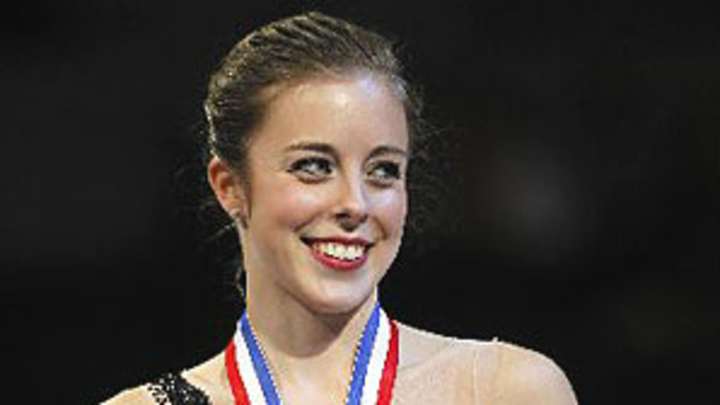Women's figure skating still searching for the next star

Halfway through the ladies' long program, which would decide the latest national champion, the competition was paused to honor the newest member of the U.S. Figure Skating Hall of Fame, Michelle Kwan.
And the current crop of skaters paled sadly in comparison.
The tribute to Kwan harkened back to skating's golden age -- an age that existed just a decade ago but in some ways seems like a million years removed.
Kwan -- a nine time national champion, five time world champion and two time Olympic medalist -- was a pop culture icon. A video montage shown at HP Pavilion illustrated the point: Kwan with Shaq, Kwan on The Simpsons, Kwan on Letterman, Kwan in People Magazine, Kwan as an answer on Jeopardy.
That kind of exposure and stardom isn't happening in the sport these days. U.S. Figure Skating for $1000, Alex?
Who are a bunch of sequined girls the public has never heard of?
There should be a few names we know by now. The Sochi Olympics are just two years away. This is a pivotal season in figure skating. Two years before the Nagano Olympics the podium included Kwan and Tara Lipinski, who went on to medal in Japan. Two years before Salt Lake, the medalists were Kwan, Sasha Cohen and Sarah Hughes.
There was a progression. There was staying power and star power and recognition by the masses. But when Ashley Wagner from Alexandria, Virginia won the competition on Saturday with a relatively clean program, she became the sixth different woman to win the title in the last seven years. Before this period of instability, Kwan won eight straight titles.
Kwan herself confessed to some difficulty keeping track of the sport she once ruled.
"A year goes by, someone comes up," Kwan said. "A year goes by, someone else comes up. When you look at U.S. Figure Skating you see a lot of potential and a lot of potential to grow."
All that potential would be fine for American skating, if the new faces rotating in and out produced something beyond a national medal. But they haven't been. For the fourth year in a row, only two skaters will represent the United States at the World Championships -- held in Nice next March. The world team is determined by how well a country's skaters do in the previous world championships. In recent years, the U.S. hasn't done well enough to send three competitors. That failure followed a streak of sending three U.S. skaters to the worlds 12 times from 1996 to 2008.
One of the recognizable skaters at this competition was Rachael Flatt. She won the title in 2010, before the Vancouver Olympics. But she finished seventh at the Olympic Games, second in last year's nationals and a disappointing 12th at the 2011 worlds when she was nursing a stress fracture.
Now a chemical engineering student at Stanford, Flatt has struggled to balance college life and training. After a disappointing short program on Thursday night, Flatt was in no position to make the podium. With nothing to lose, she came out and skated a clean long program and described herself as "overjoyed."
"It was the most relaxed I've ever been going into a program," she said. "I came in here not burdened by certain outcomes expected of me."
Burden-free, Flatt skated well. But the lack of expectations equaled a lack of results: she finished sixth. Not good enough to make the worlds and not good enough to be selected for Four Continents in Colorado Springs next month, a tournament being promoted with a giant Flatt image on the side of a Colorado Springs building.
Wagner's career has been a series of near misses.
"I'm not the 'almost girl' anymore," Wagner said.
Wagner was on the 2008 world championship team that performed poorly enough to lose a third spot the following year. She said she is determined to rectify that failure.
"I think that it's time that the U.S. makes a claim," Wagner said, "and shows the world that ladies figure skating in the U.S. is not over."
There's some sentiment that the best female skater in this week's competition was 16-year old Gracie Gold from Springfield, Illinois, who won the juniors competition. The current crop of senior ladies isn't really wowing anyone, so the search is on at the next level down.
Sixteen years ago, in the same venue where this week's competition is being held, Kwan won her first national championship. The arena was packed to the rafters, and the vibe was electric. This week, large curtains covered the top rows of seats, dropping capacity to just 9,000.
Kwan's reign began as the wave of interest stemming from the 1994 "Tonya and Nancy" Olympics was still cresting. Fans couldn't get enough skating. Ratings were through the roof. It was a golden age.
This week, that seems like a very long time ago, as the rotating national crown changed hands once again.
